-
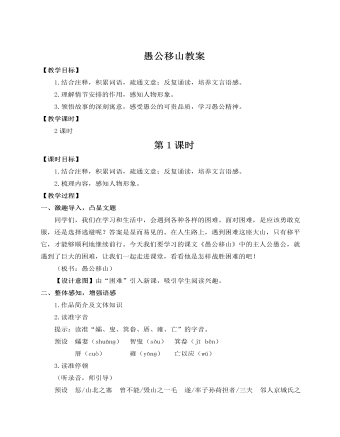
人教部编版语文八年级上册愚公移山教案
阴阳原是指日光的向背,向日为阳,背日为阴。我国古代地名中的“阴”和“阳”实际上是一种方位指示,“日之所照曰阳”,也就是说太阳所能照到的地方就称为阳。 山水阴阳是说古代以山南、水北为阳,以山北、水南为阴。 形成这种局面的原因是山峰高耸,日光能照射到的地方是山的南面;而河流位于地平面以下,所以太阳能照射到的地方其实是河流的北面。 故有“山南水北谓之阳,山北水南谓之阴”的说法。在我国历史上,很多地名及地理表述都与此关系密切,如江阴、衡阳、汉阳等。 《愚公移山》 中说:“指通豫南,达于汉阴。” 其中的“汉阴”是指汉水的南岸。 “泰山之阳,汶水西流;其阴,济水东流”(姚鼐《登泰山记》)、“所谓华山洞(南宋王象之《舆地纪胜》写为‘华阳洞’。 看正文下句,应为‘华阳洞’)者,以其乃华山之阳名之也”
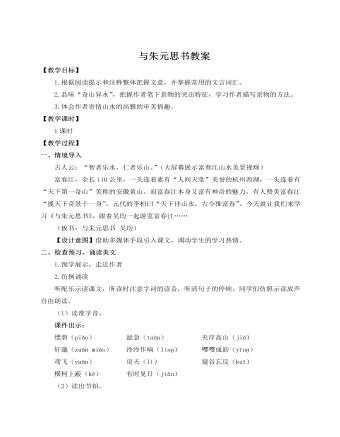
人教部编版语文八年级上册与朱元思书教案
吴均是一位善写山水的大家,他自小好学而又才智出众,但“家世寒贱”,性格耿直。在门阀制度相当严格的南朝梁,出身于庶族寒门的人,想要在政治上得到重用,着实不易,再加上他性格直来直去,口无遮拦,更是会四处碰壁。所幸的是,起先著名文史学家沈约看中了吴均的文章,“颇相称赏”。接着,吴均得到了刺史柳恽的赏识,提拔他当了郡主簿,常在一起赋诗答对。他的诗文“清拔有古气”,自成一家,时人纷纷效仿,称为“吴均体”。书信内容为何是山水游记魏晋六朝是中国历史上政治最混乱、社会最痛苦的时代,然而却是精神上极自由、极富智慧和艺术精神的时代。大自然成了情趣高雅之士审美活动的重要背景和舞台,移情山水成了当时的社会风尚。在书信中描画山水,寄托情志,成为好友间交流的一种流行方式,文人们通过书信内敛地表露自己的人生取向,他们的文学经历给后世留下了宝贵的文化遗产。吴均的《与朱元思书》《与施从事书》和《与顾章书》,以及陶弘景的《答谢中书书》皆是如此。
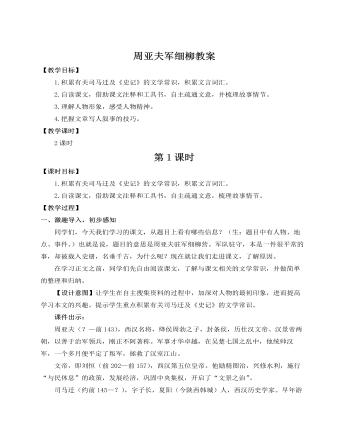
人教部编版语文八年级上册周亚夫军细柳教案
文帝之后六年,匈奴大入边。乃以宗正刘礼为将军,军霸上;祝兹侯徐厉为将军,军棘门;以河内守亚夫为将军,军细柳:以备胡。这一段主要围绕“大入边”之“大”来构建段落。整段文字看似与“大”无关,实则处处围绕“大”字做文章。写汉文帝三封将军“以备胡”,这是从内容上写胡人“入边”之“大”:边关吃紧,战势严峻。为了达到内容与形式的珠联璧合,司马迁在言语上连用三个“以……为……”的排比句式,以排山倒海的“声”势从言语上体现了“大”,以此增强文章的气势,形成一种“山雨欲来风满楼”的危急感。不仅如此,司马迁甚是在意言语细节。在连用三个“以……为……”时,打破言语的惯性,突然在第二个“以……为……”中省略了“以”字,这看似唐突,实则其心可鉴,省略第二个“以”字后,“以宗正刘礼为将军,军霸上;祝兹侯徐厉为将军,军棘门”不仅在视觉上间隔缩短,而且在朗读时彼此节奏加紧,联系更加紧密,军情更显危急,胡人“入边”之形势就显得更“大”了。而且,三个“以……为……”;“……为……”;“以……为……”之间张弛有度,一紧一松,营造了语势上的跌宕起伏,极具音韵之美。
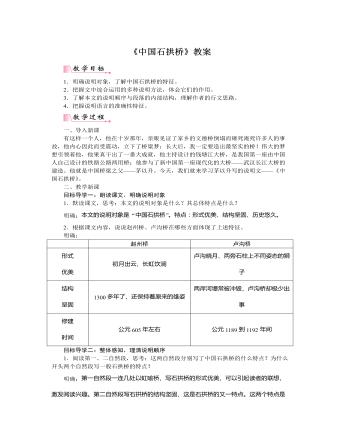
部编版语文八年级上册《中国石拱桥》教案
目标导学四:揣摩语言,把握说明效果为了准确地说明事物,说明文很讲究用语的分寸。请品味下面的语句,回答括号内的问题。1.石拱桥在世界桥梁史上出现得比较早。(“比较”一词去掉行吗?)明确:不行,“比较”程度较轻,是与其他桥梁比较而言,这样表达比较准确。2.这种桥不但形式优美,而且结构坚固。(“不但”“而且”能否删去?“结构坚固”“形式优美”能否调换顺序?)明确:“不但”“而且”不能删去,如果删去,它们之间的关系就变成了并列关系。先说外观,再说功能,符合人们的认识逻辑。并且对于桥来说,其实用价值远远重于形式,所以二者不能调换顺序。3.《水经注》里提到的“旅人桥”,大约建成于公元282年,可能是有记载的最早的石拱桥了。(“大约”“可能”“有记载的”有什么表达效果?)明确:“大约”“可能”都表示不确定,只是推测的情况。“有记载的”使话语的根据更具可靠性。

新人教版高中英语必修3Unit 5 The Value of Money-Listening &Speaking&Talking教学设计
4. A:We’d like to have someone to say a word at the beginning to welcome the group.B:↙Who?A:We thought that you or Dr.Johnson might do it.B用降调说Who,其意思是问,对方想让谁在开场时致欢迎词。Step 6 Pronunciation---Practice1. Listen to the short conversation and mark the intonation with ↗, ↙ or ↙, ↗. Then discuss with a partner what they intend to convey by using different intonation.Owner: You know what ?↗ It’s a million-pound bank note↙.Waiter 1: Really ?↗(question)Waiter 2: Really !↙(unbelievable and surprised)Waiter 3: Really ?!↙↗(first question then surprised)2. Listen to the conversations. Underline the parts that are stressed and mark the intonation. Then talk about the implied meanings of the responses with different intonations. Listen again and repeat.1) Henry: It’s a nice suit.Owner: Oh, it’s perfect!↙(The intonation means it is very suitable for Henry.)2) Henry: Well, that’s very kind of you.Owner: Kind, sir ?↗(what you said is not right) No, it’s kind of you. You must come whenever you want and have whatever you like. Just having you sit here is a great honour !!↙(welcome you to come again)3)Henry:Well, to be honest, I have none. Oliver:(happily) What luck!(excited) Brother↗, what luck!↙(It means “Didn’t you hear it?”)Henry: Well, it may seem lucky to you but not to me!↗(angry) If this is your idea of some kind of joke, I don’t think it’s very funny. Now if you’ll excuse me, I ought to be on my way.↙(If so, I would leave.)Roderick: Please don’t go↙...(hope Henry can wait for a moment)Part B Viewing and Talking---Describe people’s changing attitudes in a film clipStep 1 Before-listening---Tell the filmYou are going to watch part of the film The Million Pound Bank Note. Look at these photos and guess what happens in the film.

新人教版高中英语必修3Unit 5 The Value of Money-Listening &Speaking教学设计
Step 4: Listen again and decide if the following statements are true (T) or false (F).1 It was the first time Chen Liyan's story was reported. T口 F口2 Chen found 10,000 yuan in a small plastic bag in Taiyuan railway station口 F口3 Wang Zheng apologized to Chen because he couldn't offer her more money. T口 F口4 Chen took out a large loan to cure her daughter, T口 F口5 Wang set up a fundraising website for Chen's daughter after Chen told him about her situation. T口 F口Step 5:After listening, discuss the questions.1 What kind of person do you think Chen Liyan is?Chen Liyan is generous and honest because she returned a large sum of money to the owner.2 Did Chen return the money because she didn't need it?No. She returned the money because it was the right thing to do. Evidence for this is that she refused to accept the reward money because she felt that it had not been earned. 3 Is it common for people to do what Chen did?It depends on the culture. In some countries it is quite common to return money that has been found. In other countries, people believe "Finders are keepers!" 4 How did Wang Zheng feel about the return of his money?He must have been very happy and relieved to have gotten his money back. We know this because he thanked Chen repeatedly and even offered her a reward.5 Why did Ma Dongbao tell Wang about Chen's family?He must have had great sympathy for Chen and her daughter and wanted to help them.'We know this because he arranged help for them. 6 How did the news reporter feel about Chen's actions?The news reporter felt that it showed that money wasn't the most important thing in life. We know this because the reporter told us that this is what Chen believes. and then said, “that's a great attitude to take."

新人教版高中英语必修3Unit 5 The Value of Money-Reading and Thinking教学设计一
Everybody wants to get wealth.In today’s material world,making money or becoming wealthy symbolizes a person’s success and capability. Many people just make every effort, pay any price to attain greater wealth. With money,they can buy nice, large apartments in nice neighborhood. With money they can own luxurious cars. Wealth seems to bring all happiness in life.But is wealth the only road to happiness? Not really. There are many things in the world, which are beyond the means of money, such as friendship, love, health and knowledge. People are so preoccupied with struggling for money that they have no time or would not take the time to form or maintain friendship. What happiness can they feel living as lonely miserable creatures without love or friends in the world even if they accumulate tremendous wealth?In my opinion, people can’t do anything without money, but money is not everything. What money will bring you depends on your personal belief and goal in life. If you are kind enough to help others, especially the poor, money is a good thing to you. With it, you can do much more for the benefit of people and your country, and it will add to your own happiness. If you want money just for your own needs, you’ll never be satisfied or happy. In a word,you should have money spent for more people. Only then can money be the source of your happiness.Step 8 Homework4 students in a group, one acts Roderick, one Oliver, one servant and the fourth one acts Henry Adams, then listen to the tape, pay more attention to the difference between American English and British English in pronunciation, stress, tone.

新人教版高中英语必修3Unit 5 The Value of Money-Reading for Writing教学设计二
2. 您能看到, 我头发太长了。You can see that my hair is much too long.3. 无论什么时候, 只要您想回来就回来。Please come back whenever you want.4. 您仅有很少的头发要理! You only have too little hair to cut !5. 为您服务是我的荣幸!It is my honour to serve you!Step 9 Writing(Henry is walking down the street when he sees a sign for a place that cuts hair. He decides to have it cut. )H=Henry B=BarberH: Good afternoon, I’d like to have my hair cut, if I may. (The barber looks at Henry’s hair and continues cutting another man’s hair. ) Er, I’d really like a haircut. As you can see it’s much too long. B: (in a rude manner) Yes, I can see that. Indeed, I can. H: Fine, well, I’ll have a seat then. (He sits in one of the barber’s chairs. The barber turns to look at Henry. )B: It’s quite expensive here, you know! Are you sure you can afford it?H: Yes. I think so. (After his hair is cut, the barber tells Henry how much he must pay. Henry shows the barber the bank note. )B: Why Mr. . . (looks shocked)H: Adams. Henry Adams. I’m sorry. I don’t have any change. B: Please don’t worry! (wearing a big smile) Nothing to worry about! Nothing at all! Please come back whenever you want, even if you only have too little hair to cut! It will be my honour to serve you!Step 10 Pair workExchange drafts with a partner. Use this checklist to help your partner revise his/her draft.1. Are all the elements of a play included and in good order ?2. Do the character use suitable language ?3. Are the stage directions clear and useful ?4. Is the plot clear and exciting enough ?

新人教版高中英语必修3Unit 5 The Value of Money- Discovering Useful Structure教学设计
Step 3 Meaning1. 过去将来时表示从过去某一时间来看将要发生的动作或存在的状态, 常用在宾语从句中。一般由“would/should +动词原形”构成。She hoped that they would meet again someday. 她希望将来有一天他们能再见面。2. was/were going to+动词原形: 表示过去将要发生或很有可能发生的动作, 常用于口语中, 表示预言、意图或者打算等。He was going to start work the following week. 他打算下星期开始工作。3. was/were about to do: 常用来表示即将发生的动作, “刚要/正要做……”。注意该结构不与任何时间状语连用。I felt that something terrible was about to happen. 我感到某种可怕的事情即将发生。4.was/were to do: 表示“曾计划做某事”, 如果表示“本来计划做某事, 动作没实现”, 则需用 “was/were to have done”。She said she was to have told me about the accident. 她说她本来想告诉我关于事故的事。5.Start, go, come, leave, see, meet等动词的过去进行时: 表示就过去某一时刻而言即将发生的动作。She was coming later. 她随后就来。I had just put on my overcoat and was leaving to visit a friend of mine. 我刚穿上外套要去看我的一个朋友。

新人教版高中英语必修3Unit 5 The value of money-Reading and Thinking教学设计二
? Could you offer me some kind of work here?? I don’t want your charity, I just want an honest job.? Careless: I landed in Britain by accident.Step 7:Consolidation.? Find Henry? Roderick and Oliver were I .making a bet when they saw Henry, a poor young man. ? Know Henry? About a month ago, Henry was sailing and later he found himself carried out to sea by a strong wind. Fortunately, he 2.was spotted by a ship. And it was the ship that brought him to 3.England? Offer money to Henry ? Oliver and Roderick gave Henry a letter and told him that there was money in it. They 4.persuaded him to accept it, and made him 5.promise that it wouldn't be opened until 2 o'clock.Step 8:Language pointsa large amount of: a large quantity of; a great deal ofe.g. They bought a large amount of furniture before they moved their new house.make a bet: make an arrangement to risk money, etc. on an event of which the result is doubtful.e.g. We made a bet on the result of the match.permit sb to do something: allow somebody to do somethinge.g. My mother doesn’t permit me to ride in the street after it rained.by accident: as a result of chancee.g. I only found it by accident.stare at: look at somebody or something with the eyes wide open in a fixed gaze( in astonishment, wonder, fear, etc)to be honest: to tell you the truth; to be franke.g. To be honest, I don’t think we have a chance of winning.Step7 Homework:What do you think will happen to Henry? Will the bank-note help him or get him into trouble?

新人教版高中英语必修3Unit 5 the value of money-Reading For Writing教学设计一
【参考范文】Narrator:(Henry is smiling as he leaves the restaurant. As he is walking down the street, he sees a sign for a place that cuts hair. He decides to get it cut. )H=Henry;B=Barber;R=rude manH:Good afternoon, I'd like to get a cut, if I may. (The barber looks at Henry's hair and continues cutting another man's hair. )Er, I'd really like a haircut. As you can see it's much too long. B:(in a rude manner) Yes, I can see that. Indeed, I can. H:Fine, well I'll have a seat then. (He sits in one of the barber's chairs. The barber turns to look at Henry. )B:It's quite expensive here, you know!Are you sure you can afford it?H:Yes. I think so. (In comes the rude man. )R:Hey you there. I need a haircut quickly. Can you do me straightaway?B:All right, then, get in the chair and I'll see what I can do. R:Thank you. (sits down in one of the barber's chairs)H:Excuse me, but I was here first. Aren't you going to do my hair first?B:This man's in a hurry. H:Well so am I!I insist that you cut my hair first. B:OK, but I'll have to be quick. This gentleman is waiting. H:Thank you. (They both become quiet. After his hair is cut, the barber tells Henry how much he must pay. Henry shows the barber the bank note. )B:Why, Mr . . . (looks shocked)H:Adams. Henry Adams. I'm sorry, I don't have any change. R:You're that Mr Adams! Well,I'm glad I waited or I might never have known it was you. B:Why, Mr Adams, please don't worry!(wearing a big smile) Nothing to worry about!Nothing at all!Please come back any time, even if you only need too little hairs cut!It will be my honour to serve you!

新人教版高中英语必修3Unit 5 The Value of Money-Discovering Useful Structures导学案
4.They were going to find someone to take part in their bet when they saw Henry walking on the street outside.[归纳]1.过去将来时的基本构成和用法过去将来时由“would+动词原形”构成,主要表示从过去某一时间来看将要发生的动作(尤其用于宾语从句中),还可以表示过去的动作习惯或倾向。Jeff knew he would be tired the next day.He promised that he would not open the letter until 2 o'clock.She said that she wouldn't do that again.2.表示过去将来时的其他表达法(1)was/were going to+动词原形:该结构有两个主要用法,一是表示过去的打算,二是表示在过去看来有迹象表明将要发生某事。I thought it was going to rain.(2)was/were to+动词原形:主要表示过去按计划或安排要做的事情。She said she was to get married next month.(3)was/were about to+动词原形:表示在过去看来即将要发生的动作,由于本身已含有“即将”的意味,所以不再与表示具体的将来时间状语连用。I was about to go to bed when the phone rang.(4)was/were+现在分词:表示在过去看来即将发生的动作,通常可用于该结构中的动词是come,go,leave,arrive,begin,start,stop,close,open,die,join,borrow,buy等瞬间动词。Jack said he was leaving tomorrow.

初中历史与社会人教版九年级下册《地球一小时 活动》教材教案
地球一小时(Earth Hour)是世界自然基金会(WWF)应对全球气候变化所提出的一项倡议,希望家庭及商界用户关上不必要的电灯及耗电产品一小时。来表明他们对应对气候变化行动的支持。过量二氧化碳排放导致的气候变化目前已经极大地威胁到地球上人类的生存。公众只有通过改变全球民众对于二氧化碳排放的态度,才能减轻这一威胁对世界造成的影响。地球一小时在3月的最后一个星期六20:30~21:30期间熄灯。活动由来:“地球1小时”也称“关灯一小时”,是世界自然基金会在2007年向全球发出的一项倡议:呼吁个人、社区、企业和政府在每年三月最后一个星期六20:30~21:30期间熄灯1小时,以此来激发人们对保护地球的责任感,以及对气候变化等环境问题的思考,表明对全球共同抵御气候变暖行动的支持。这是一项全球性的活动,世界自然基金会于2007年首次在悉尼倡导之后,以惊人的速度席卷全球,大家都来参加这个活动。[1] “地球1小时”活动首次于2007年3月31日在澳大利亚的悉尼展开,一下子吸引了超过220万悉尼家庭和企业参加;随后,该活动以惊人的速度迅速席卷全球。在2008年,WWF(中国)对外联络处透露,全球已经有超过80个国家、大约1000座城市加入活动。2013年,包括悉尼歌剧院、帝国大厦、东京塔、迪拜塔、白金汉宫在内的各国标志性建筑也在当地时间晚八点半熄灯一小时。[2] ,其中包括巴勒斯坦、法属圭亚那、加拉帕戈斯群岛、卢旺达、圣赫勒那岛、苏里南、突尼斯等首次参与“地球一小时”的国家和地区。在中国,北京鸟巢、水立方、世贸天阶等标志性建筑同时熄灯,同一时段,从上海东方明珠到武汉黄鹤楼,从台北101到香港天际100观景台,中国各地多个标志性建筑均熄灯一小时,全国共有127个城市加入“地球一小时”活动。
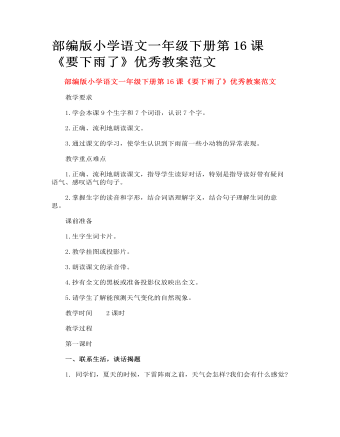
部编版小学语文一年级下册第16课《要下雨了》优秀教案范文
由扶到放,学习课文 1.指导学习一至三段。 (1)指名读第一段。学习生字"弯、直",通过做动作理解词义。 (2)练习朗读第一段,可边读边做动作。 (3)教师引读第二段:小燕子从他头上飞过。小白兔大声喊--(学生读)。 (4)引导学生看第一幅挂图:小燕子飞得很低,小白兔奇怪地向燕子为什么飞得这么低。学生练习朗读小白兔喊叫的句子,提醒学生注意提示语"大声喊"和句尾问号。 (5)先指名读第三段,然后逐句以问引读: ① 教师指第一句问:燕子边飞边说-- ②空气怎么样呢--(学生接读第二句)虫子的翅膀可比鸟的翅膀小多了,薄多了,就像透明的纱一样,沾上了小水珠,就像人背上了铅球一样沉重,自然就飞不高了。再读第二句。 ③那小燕子飞不高是什么原因呢?学生读最后一句,教师板书:捉虫子,学习生字"捉",练习朗读句子。
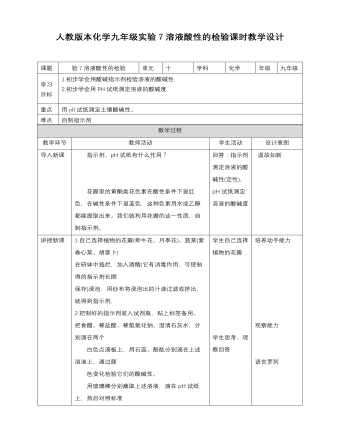
初中化学人教版九年级下册《实验活动7溶液酸碱性的检验》教案
1.自己选择植物的花瓣(牵牛花、月季花)、蔬菜(紫卷心菜、胡萝卜) 在研钵中捣烂,加入酒精(它有消毒作用,可使制得的指示剂长期 保存)浸泡,用纱布将浸泡出的汁液过滤或挤出,就得到指示剂, 2.把制好的指示剂装入试剂瓶,贴上标签备用。 把食醋、稀盐酸、稀氢氧化钠、澄清石灰水,分别滴在两个 白色点滴板上,用石蕊、酚酞分别滴在上述溶液上,通过颜 色变化检验它们的酸碱性。 用玻璃棒分别蘸取上述溶液,滴在pH试纸上,然后对照标准 比色卡比较,得出pH值,也就是酸碱度。 把上述溶液滴在白色点滴板上,用滴管吸一下你自制的指示剂,滴在滴板的溶液里,观察颜色变化,每用一种指示剂,换一下滴板的溶液。 把所得到颜色变色变化的信息和pH值数据填入教材第70页的表中。 3.取少量土壤样品,将土壤样品与蒸馏水按1∶5的质量比在烧杯中混合, 充分搅拌后静置,用玻璃棒蘸澄清的液体,滴在pH试纸上,然后对照 标准比色卡记录读数。
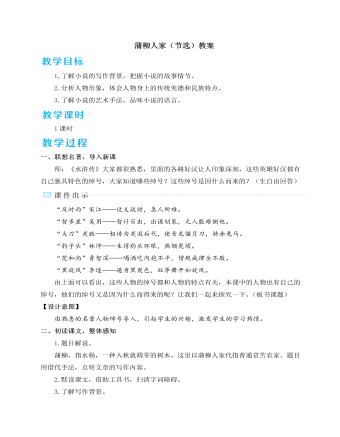
人教部编版语文九年级下册蒲柳人家(节选)教案
刘绍棠,中国当代著名乡土文学作家,1936年2月出生于河北通县(今北京通州区)大运河畔的儒林村,1949年开始发表作品,一生留下了500多万字的乡土文学作品,包括《地火》《京门脸子》等多部长篇小说,《蒲柳人家》《运河的桨声》等多部中篇小说,以及《青枝绿叶》《蛾眉》等多部短篇小说集。他的作品在国内多次获奖,在国际上亦有影响。刘绍棠的作品内容各不相同,但都艺术地再现了其家乡大运河畔不同历史时期的风土人情和社会风貌,描绘了充满诗情画意的乡风水色、世俗人情。20世纪80年代以来,刘绍棠不遗余力地倡导乡土文学,创作上坚持“中国气派,民族风格,地方特色,乡土题材”。文学评论家指出,他的作品格调清新淳朴,乡土色彩浓郁,形成了独具特色的大运河乡土文学风格。
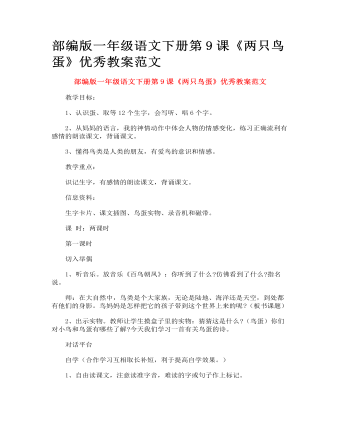
部编版一年级语文下册第9课《两只鸟蛋》优秀教案范文
朗读(读说思议练结合,培养学生语文综合能力。) 1、学习第一小节: (1)指名读,回忆刚才摸鸟蛋的感觉(小小的、凉凉的)体会着读一读。 (2)比较“鸟蛋凉凉的”和“凉凉的鸟蛋”:你发现了什么?(引导学生发现这类词语的特点:词序不同,但表达的意思相同。)除了凉凉的鸟蛋还有什么是凉凉的? (3)你还能像这样再说几个吗? (如果学生说不出来,教师可进行指导,把写有“花儿、小草、柳枝、大海,红红的、绿绿的、软软的、蓝蓝的”的词语卡分给学生,让拥有不同词语的学生去找朋友,再让两个朋友变换左右顺序。) 2、学习第二小节: (1)轻声读文,思考:你怎么知道两只鸟蛋就是两只小鸟? (2)出示小鸟破壳的图片或课件,引导学生说一说。 (3)启发想象:鸟妈妈焦急不安是什么样?你能表演一下吗? 表演后试着把妈妈的语气读出来。 (4)你还能用焦急不安说句话吗?看谁说得和别人不一样?
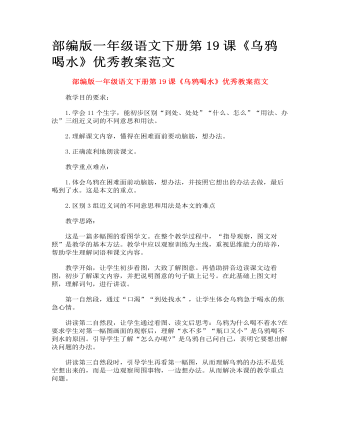
部编版一年级语文下册第19课《乌鸦喝水》优秀教案范文
教学思路: 这是一篇多幅图的看图学文。在整个教学过程中,“指导观察,图文对照”是教学的基本方法。教学中应以观察训练为主线,重视思维能力的培养,帮助学生理解词语和课文内容。 教学开始,让学生初步看图,大致了解图意。再借助拼音边读课文边看图,初步了解课文内容,并把说明图意的句子做上记号。在此基础上图文对照,理解词句,进行讲读。 第一自然段,通过“口渴”“到处找水”,让学生体会乌鸦急于喝水的焦急心情。 讲读第二自然段,让学生通过看图、读文后思考:乌鸦为什么喝不着水?在要求学生对第一幅图画面的观察后,理解“水不多”“瓶口又小”是乌鸦喝不到水的原因。引导学生了解“怎么办呢?”是乌鸦自己问自己,表明它要想出解决问题的办法。 讲读第三自然段时,引导学生再看第一幅图,从而理解乌鸦的办法不是凭空想出来的,而是一边观察周围事物,一边想办法。从而解决本课的教学重点问题。
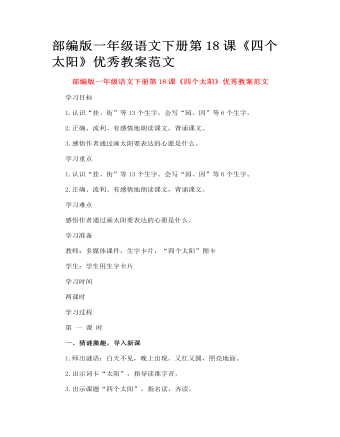
部编版一年级语文下册第18课《四个太阳》优秀教案范文
猜谜激趣,导入新课 1.师出谜语:白天不见,晚上出现。又红又圆,照亮地面。 2.出示词卡“太阳”,指导读准字音。 3.出示课题“四个太阳”,指名读,齐读。 4.引导质疑:读了课题,你的小脑瓜里是不是蹦出了小问号? 二、初读课文,认记生字 1.出示课件:带拼音生字,指名带读。 2.出示课件:去拼音生字并打乱顺序,摆字卡,自由练习朗读。 3.游戏:我说你找喊名字。 4.指导识记生字方法。 5.巩固游戏:我把生字送回家。动画演示,指导写字 1.猜谜引入:大口框里有个“大” 2.出示课件:“因”书写笔顺规则 看了动画,你知道了什么? 3.出示课件:“园” “园”与“因”哪里长得很像?书写的时候要注意些什么?(同样先里面后封口) 4.师范写“园”“因”,讲解书写要领。 5.生自由练写,师巡回指导。 6.集体评价。
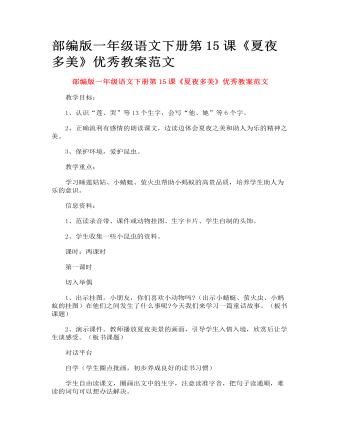
部编版一年级语文下册第15课《夏夜多美》优秀教案范文
自学(学生圈点批画,初步养成良好的读书习惯) 学生自由读课文,圈画出文中的生字,注意读准字音,把句子读通顺,难读的词句可以想办法解决。 识字(多种方式巧记生字,激发学生主动识字的愿望) 教师出示生字词,学生互相交流自己的识字秘诀(如歌谣识字、猜谜识字、做动作识字、偏旁归类识字等) (部分学生识字方法单一、枯燥,互相交流利于学生反思,开动脑筋巧记生字;另外对于学生的识字秘诀,教师要及时鼓励,让他们体验到主动识字的乐趣。) 朗读(多层次自主阅读,拓展思维空间,提高阅读质量。) 1、检查读。教师以开火车的形式让学生按自然段读课文,看谁读得既正确又流利。 2、指正读。把你喜欢的小动物的话找出来读一读,教师随机指导。 3、想象读。先听范读录音,然后指名读文,边读边想象当时的情景。 4、分角色读。教师指导学生研究讨论每个角色的语气怎样读,并尝试给这些角色设计表情动作。





